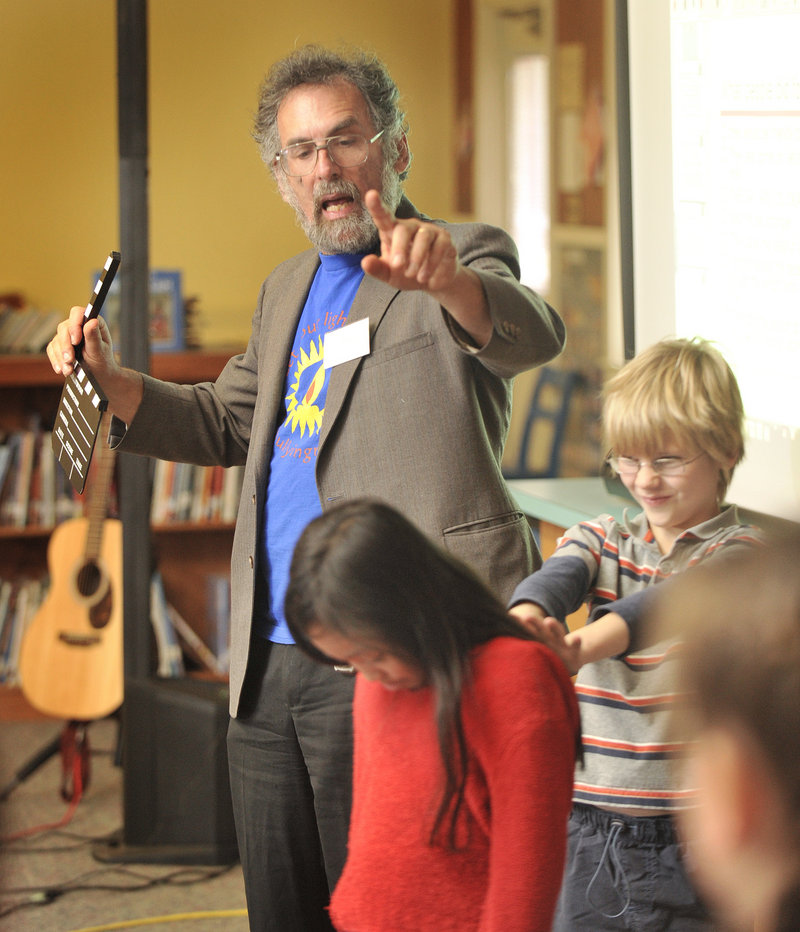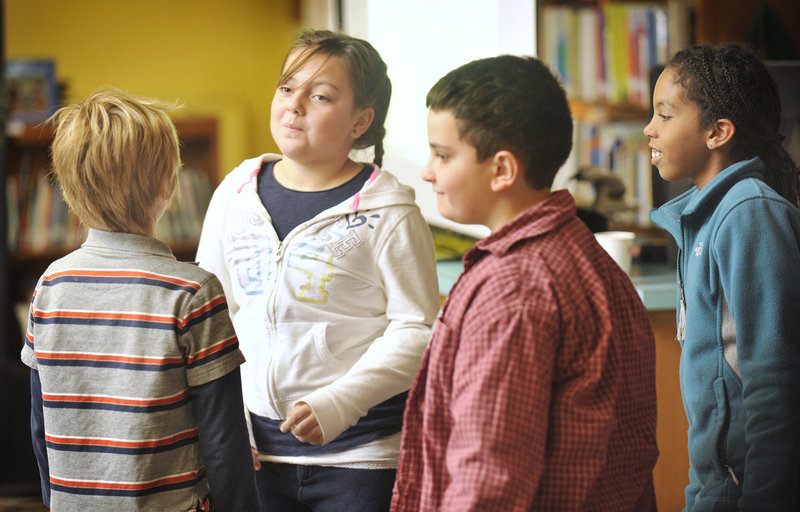Editor’s note: This story is part of an occasional series about discipline in Maine schools.
PORTLAND – Stan Davis isn’t big on the word “bullying” anymore.
That’s a surprising statement from someone who’s considered a nationally known expert on the subject.
Bullying is a misleading term because it means different things to different people, Davis told a group of parents at Hall Elementary School on Wednesday night. It also feeds the stereotype that bullying encompasses certain behaviors that are repeated by kids who are viewed as bullies.
“The reality is, everybody does mean stuff sometimes,” Davis said. “There are behaviors that interfere with learning, and they shouldn’t happen.”
Hosted by the Hall Parent-Teacher Organization, Davis spent the day working with groups of students and staff members on strategies to empower bystanders to act in the face of peers’ mistreatment.
Davis, who lives in Wayne, is a former civil rights worker, child therapist and school counselor. He wrote “Schools Where Everyone Belongs: Practical Strategies in Reducing Bullying” and “Empowering Bystanders in Bullying Prevention.”
State and local officials across Maine have stepped up their efforts to prevent bullying, in response to increasing reports nationally of youths committing suicide after being harassed by peers.
In the spring, the Maine Department of Education sent a letter reminding superintendents that state law requires them to provide safe, fair and responsive schools. State law also requires school districts to adopt policies against bullying.
In May, the Governor’s Children’s Cabinet discussed ways to increase support for bullying prevention efforts. It produced a best-practices guide on the subject in 2006, which is on the education department’s website.
In June, the department expanded its anti-bullying web pages to offer school staffers training opportunities, free survey tools, links to related resources and networking opportunities for parents, teachers and others.
This is the third year in a row that Davis has visited Hall as part of a schoolwide initiative to sustain a welcoming, inclusive and responsive school culture.
Principal Kelly Hasson said Davis’ methods mesh with the school’s effort to form productive, respectful and responsible citizens.
“We want kids to develop an intrinsic desire to do the right thing,” Hasson said.
Davis is researching peer mistreatment in schools with Charisse Nixon, a developmental psychology professor at Penn State Erie. They have surveyed 13,000 students in grades five through 12 in 31 schools nationwide. Early results of their work are posted at youthvoiceproject.com.
So far, they have found that 25 percent of students surveyed reported being targets of frequent verbal, physical and relational aggressive behavior.
One-fifth of students who reported being mistreated to a teacher were told they were tattling, Davis said. He noted that students accused of tattling were more often special education students, minorities and boys. He showed examples of children’s storybooks that warn kids against tattling.
“My proposal is, we stop telling kids anything about tattling,” Davis said. “When they become teenagers, the problem is not too much telling, but too little.”
Davis said the most important thing school staff members can do is listen when students come to them with problems. They also should follow up with students to see if interventions have been successful.
In their research, Davis and Nixon found that among students who reported an abusive peer to a teacher, 48 percent said the situation improved afterward.
Davis had some good news. A survey of Hall’s fifth-graders showed that when they reported an abusive peer to a teacher, 63 percent said the situation improved afterward. Still, Davis said, Hall teachers want to improve their success rate.
One parent asked how she might dissuade children from shunning particular students, such as refusing to sit with them or calling them names. Davis said the days should be gone when teachers or parents tell students to ignore peers’ mistreatment and leave them to deal with it alone.
Another parent asked how he could encourage his child to intervene on behalf of a student who’s being mistreated by a peer.
Davis suggested having a weekly accounting of good deeds at the dinner table.
“Have them tell about an act of kindness they’ve done each week,” Davis said. Acknowledge even the smallest acts, he said, and note how good it feels to help others.
If a parent learns that his or her child has mistreated a student, Davis suggested reviewing other actions that made the child feel good without being mean.
After all, Davis said, the strongest path to success is past success.
Staff Writer Kelley Bouchard can be contacted at 791-6328 or at:
kbouchard@pressherald.com
Send questions/comments to the editors.




Success. Please wait for the page to reload. If the page does not reload within 5 seconds, please refresh the page.
Enter your email and password to access comments.
Hi, to comment on stories you must . This profile is in addition to your subscription and website login.
Already have a commenting profile? .
Invalid username/password.
Please check your email to confirm and complete your registration.
Only subscribers are eligible to post comments. Please subscribe or login first for digital access. Here’s why.
Use the form below to reset your password. When you've submitted your account email, we will send an email with a reset code.